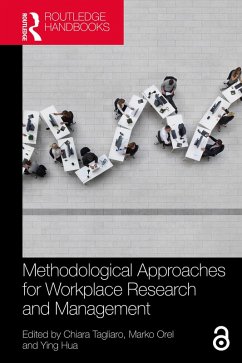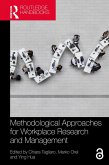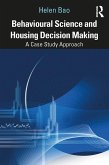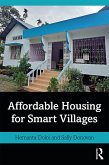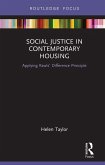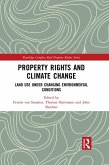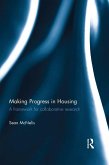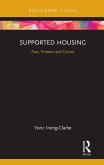Methodological Approaches for Workplace Research and Management (eBook, PDF)
Redaktion: Tagliaro, Chiara; Hua, Ying; Orel, Marko
0,00 €
0,00 €
inkl. MwSt.
Sofort per Download lieferbar

0 °P sammeln
0,00 €
Als Download kaufen

0,00 €
inkl. MwSt.
Sofort per Download lieferbar

0 °P sammeln
Jetzt verschenken
Alle Infos zum eBook verschenken
0,00 €
inkl. MwSt.
Sofort per Download lieferbar
Alle Infos zum eBook verschenken

0 °P sammeln
Methodological Approaches for Workplace Research and Management (eBook, PDF)
Redaktion: Tagliaro, Chiara; Hua, Ying; Orel, Marko
- Format: PDF
- Merkliste
- Auf die Merkliste
- Bewerten Bewerten
- Teilen
- Produkt teilen
- Produkterinnerung
- Produkterinnerung

Bitte loggen Sie sich zunächst in Ihr Kundenkonto ein oder registrieren Sie sich bei
bücher.de, um das eBook-Abo tolino select nutzen zu können.
Hier können Sie sich einloggen
Hier können Sie sich einloggen
Sie sind bereits eingeloggt. Klicken Sie auf 2. tolino select Abo, um fortzufahren.

Bitte loggen Sie sich zunächst in Ihr Kundenkonto ein oder registrieren Sie sich bei bücher.de, um das eBook-Abo tolino select nutzen zu können.
This book explores a wide range of methodological approaches to examining various forms of workplace physical environments.
- Geräte: PC
- ohne Kopierschutz
- eBook Hilfe
- Größe: 11.94MB
Andere Kunden interessierten sich auch für
![Methodological Approaches for Workplace Research and Management (eBook, ePUB) Methodological Approaches for Workplace Research and Management (eBook, ePUB)]() Methodological Approaches for Workplace Research and Management (eBook, ePUB)0,00 €
Methodological Approaches for Workplace Research and Management (eBook, ePUB)0,00 €![Behavioural Science and Housing Decision Making (eBook, PDF) Behavioural Science and Housing Decision Making (eBook, PDF)]() Helen BaoBehavioural Science and Housing Decision Making (eBook, PDF)45,95 €
Helen BaoBehavioural Science and Housing Decision Making (eBook, PDF)45,95 €![Affordable Housing for Smart Villages (eBook, PDF) Affordable Housing for Smart Villages (eBook, PDF)]() Hemanta DoloiAffordable Housing for Smart Villages (eBook, PDF)51,95 €
Hemanta DoloiAffordable Housing for Smart Villages (eBook, PDF)51,95 €![Social Justice in Contemporary Housing (eBook, PDF) Social Justice in Contemporary Housing (eBook, PDF)]() Helen TaylorSocial Justice in Contemporary Housing (eBook, PDF)24,95 €
Helen TaylorSocial Justice in Contemporary Housing (eBook, PDF)24,95 €![Property Rights and Climate Change (eBook, PDF) Property Rights and Climate Change (eBook, PDF)]() Property Rights and Climate Change (eBook, PDF)48,95 €
Property Rights and Climate Change (eBook, PDF)48,95 €![Making Progress in Housing (eBook, PDF) Making Progress in Housing (eBook, PDF)]() Sean McNelisMaking Progress in Housing (eBook, PDF)44,95 €
Sean McNelisMaking Progress in Housing (eBook, PDF)44,95 €![Supported Housing (eBook, PDF) Supported Housing (eBook, PDF)]() Yoric Irving-ClarkeSupported Housing (eBook, PDF)23,95 €
Yoric Irving-ClarkeSupported Housing (eBook, PDF)23,95 €-
-
-
This book explores a wide range of methodological approaches to examining various forms of workplace physical environments.
Dieser Download kann aus rechtlichen Gründen nur mit Rechnungsadresse in A, B, BG, CY, CZ, D, DK, EW, E, FIN, F, GR, HR, H, IRL, I, LT, L, LR, M, NL, PL, P, R, S, SLO, SK ausgeliefert werden.
Produktdetails
- Produktdetails
- Verlag: Taylor & Francis eBooks
- Seitenzahl: 228
- Erscheinungstermin: 14. September 2023
- Englisch
- ISBN-13: 9781000892628
- Artikelnr.: 68781182
- Verlag: Taylor & Francis eBooks
- Seitenzahl: 228
- Erscheinungstermin: 14. September 2023
- Englisch
- ISBN-13: 9781000892628
- Artikelnr.: 68781182
- Herstellerkennzeichnung Die Herstellerinformationen sind derzeit nicht verfügbar.
Chiara Tagliaro works as a fixed-term researcher and consultant in the Real Estate Center at Politecnico di Milano. Her research interests concern the design, management, and use of workplaces, collaborative work practices, and the digitalisation of the real estate sector. She has been involved in two EU-funded projects around these topics: "The geography of new working spaces and the impact on the periphery"; and "An innovative approach in workplace management education". She has coordinated the Summer School on Workplace Management since its first edition in 2018. She organised the third TWR conference in 2022 in Milan, Italy. Marko Orel is an organisational sociologist who works as an assistant professor and a head of the Centre for Workplace Research (CWER) at Prague University of Economics and Business. He specialises in exploring the changing nature of the workplace and the transformation of work and work-related processeMarko is currently exploring experimental, qualitative research methodologies. He recently guest-edited a special issue on workplace transformation at Emerald's Journal of Corporate Real Estate, edited a volume on flexible workplaces that Springer Nature has published, and has published several chapters and research papers in journals such as World Leisure Journal, Mobile Networks & Applications, Review of Managerial Science, and others. Ying Hua is an Associate Professor (tenured) in the Cornell Department of Human Centred Design, and is Director of the Cornell China Center. She is a member of the graduate field and advisor in the Cornell Baker Program in Real Estate, a faculty fellow of the Atkinson Center for a Sustainable Future and the Cornell Institute of Healthy Futures, Vice-Chair of the Faculty Advisory Board of the Atkinson Center, and core faculty of the Cornell East Asia Program. Dr Hua leads the International Workplace Studies Program (IWSP) with both research and consulting work. Her research addresses design and management challenges across multiple phases of project life-cycle, with a particular interest in future work and workplace in the US, Japan, and China. She has a track record of 17 papers indexed in Scopus (h-index 9), and has been a frequent speaker at international conferences and high-profile events.
Contents
FOREWORD. Appel-Meulenbroek, R. & Danivska, V.
PREFACE. Expanding the understanding of methodological approaches for
workplace research and management in the new era. Tagliaro, C., Orel, M.,
Hua, Y.
OUTLOOK. Collecting methods for transdisciplinary workplace research and
management. Tagliaro, C.
1. Workplace autoethnography. Exploring the place through aspects of the
self. Orel, M.
2. Affective ethnography. Interpreting body language in the workplace
fieldwork. Holck, L.
3. Digital ethnography. Understanding platform labour from within.
Ritter, C.S.
4. Critical Discourse Analysis. Studying the symbolic aspects of
workplaces. Shadnam, M
5. Diary studies. Capturing real-time experiences in the workplace.
Soucek, R., Weber, C., Gunkel, J. & Degenhardt, B.
6. Cluster analysis. Grouping workers by work location choice.
Migliore, A. & Rossi-Lamastra, C.
7. Stated choice experiments. Identifying workplace preferences and
behaviours. Appel-Meulenbroek, R. & Kemperman, A.
8. Delphi method. Reaching consensus on workplace performance.
Tagliaro, C.
9. Social Network Analysis. Studying social interactions and relations
in the workplace. Zhou, Y.
10. Surveys. Gathering data for workplace Post-Occupancy Evaluation.
Hua, Y.
11. Space syntax. Examining human-workplace behaviour through isovists
and shortest paths. Koutsolampros, P.
12. Journey mapping. Describing the spatial experience of workplace
users. Iadarola, A.
13. COMPENDIUM. Choosing methods for workplace research and management.
Shepley, M.
14. WIND-UP. On methodological takeaways and the importance of workplace
research. Orel, M.
FOREWORD. Appel-Meulenbroek, R. & Danivska, V.
PREFACE. Expanding the understanding of methodological approaches for
workplace research and management in the new era. Tagliaro, C., Orel, M.,
Hua, Y.
OUTLOOK. Collecting methods for transdisciplinary workplace research and
management. Tagliaro, C.
1. Workplace autoethnography. Exploring the place through aspects of the
self. Orel, M.
2. Affective ethnography. Interpreting body language in the workplace
fieldwork. Holck, L.
3. Digital ethnography. Understanding platform labour from within.
Ritter, C.S.
4. Critical Discourse Analysis. Studying the symbolic aspects of
workplaces. Shadnam, M
5. Diary studies. Capturing real-time experiences in the workplace.
Soucek, R., Weber, C., Gunkel, J. & Degenhardt, B.
6. Cluster analysis. Grouping workers by work location choice.
Migliore, A. & Rossi-Lamastra, C.
7. Stated choice experiments. Identifying workplace preferences and
behaviours. Appel-Meulenbroek, R. & Kemperman, A.
8. Delphi method. Reaching consensus on workplace performance.
Tagliaro, C.
9. Social Network Analysis. Studying social interactions and relations
in the workplace. Zhou, Y.
10. Surveys. Gathering data for workplace Post-Occupancy Evaluation.
Hua, Y.
11. Space syntax. Examining human-workplace behaviour through isovists
and shortest paths. Koutsolampros, P.
12. Journey mapping. Describing the spatial experience of workplace
users. Iadarola, A.
13. COMPENDIUM. Choosing methods for workplace research and management.
Shepley, M.
14. WIND-UP. On methodological takeaways and the importance of workplace
research. Orel, M.
Contents
FOREWORD. Appel-Meulenbroek, R. & Danivska, V.
PREFACE. Expanding the understanding of methodological approaches for
workplace research and management in the new era. Tagliaro, C., Orel, M.,
Hua, Y.
OUTLOOK. Collecting methods for transdisciplinary workplace research and
management. Tagliaro, C.
1. Workplace autoethnography. Exploring the place through aspects of the
self. Orel, M.
2. Affective ethnography. Interpreting body language in the workplace
fieldwork. Holck, L.
3. Digital ethnography. Understanding platform labour from within.
Ritter, C.S.
4. Critical Discourse Analysis. Studying the symbolic aspects of
workplaces. Shadnam, M
5. Diary studies. Capturing real-time experiences in the workplace.
Soucek, R., Weber, C., Gunkel, J. & Degenhardt, B.
6. Cluster analysis. Grouping workers by work location choice.
Migliore, A. & Rossi-Lamastra, C.
7. Stated choice experiments. Identifying workplace preferences and
behaviours. Appel-Meulenbroek, R. & Kemperman, A.
8. Delphi method. Reaching consensus on workplace performance.
Tagliaro, C.
9. Social Network Analysis. Studying social interactions and relations
in the workplace. Zhou, Y.
10. Surveys. Gathering data for workplace Post-Occupancy Evaluation.
Hua, Y.
11. Space syntax. Examining human-workplace behaviour through isovists
and shortest paths. Koutsolampros, P.
12. Journey mapping. Describing the spatial experience of workplace
users. Iadarola, A.
13. COMPENDIUM. Choosing methods for workplace research and management.
Shepley, M.
14. WIND-UP. On methodological takeaways and the importance of workplace
research. Orel, M.
FOREWORD. Appel-Meulenbroek, R. & Danivska, V.
PREFACE. Expanding the understanding of methodological approaches for
workplace research and management in the new era. Tagliaro, C., Orel, M.,
Hua, Y.
OUTLOOK. Collecting methods for transdisciplinary workplace research and
management. Tagliaro, C.
1. Workplace autoethnography. Exploring the place through aspects of the
self. Orel, M.
2. Affective ethnography. Interpreting body language in the workplace
fieldwork. Holck, L.
3. Digital ethnography. Understanding platform labour from within.
Ritter, C.S.
4. Critical Discourse Analysis. Studying the symbolic aspects of
workplaces. Shadnam, M
5. Diary studies. Capturing real-time experiences in the workplace.
Soucek, R., Weber, C., Gunkel, J. & Degenhardt, B.
6. Cluster analysis. Grouping workers by work location choice.
Migliore, A. & Rossi-Lamastra, C.
7. Stated choice experiments. Identifying workplace preferences and
behaviours. Appel-Meulenbroek, R. & Kemperman, A.
8. Delphi method. Reaching consensus on workplace performance.
Tagliaro, C.
9. Social Network Analysis. Studying social interactions and relations
in the workplace. Zhou, Y.
10. Surveys. Gathering data for workplace Post-Occupancy Evaluation.
Hua, Y.
11. Space syntax. Examining human-workplace behaviour through isovists
and shortest paths. Koutsolampros, P.
12. Journey mapping. Describing the spatial experience of workplace
users. Iadarola, A.
13. COMPENDIUM. Choosing methods for workplace research and management.
Shepley, M.
14. WIND-UP. On methodological takeaways and the importance of workplace
research. Orel, M.
